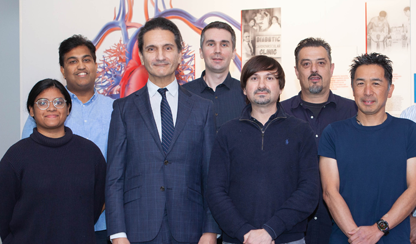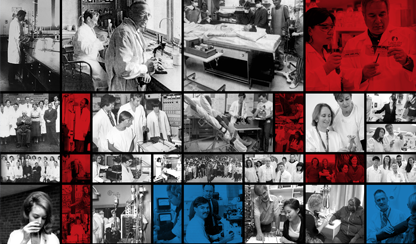18 May 2023
Institute news

We are delighted to announce that we have a new laboratory in human epigenetics.
This lab aims to identify biomarkers that aid in understanding disease progression and to develop potential targets for drug therapies that protect the pancreas in people with diabetes.
Professor Sam El-Osta is heading up the Epigenetics in Human Health and Disease lab, which involves the study of how the environment can cause changes to gene behaviour without changing the DNA sequence.
Professor El-Osta, who has previously worked at the Baker Institute and returns after several years at Monash University, is a NHMRC Senior Research Fellow and internationally recognised as an epigeneticist with more than 250 published articles. He has developed a training program for early career scientists (ECSs) in the technologies critical for epigenetics research, with a major objective being supervision of local and international students. He is an Adjunct Professor with the Chinese University of Hong Kong, Honorary at University College Copenhagen, and is committed to gender, equity, diversity, and inclusion for international ECSs.
Prof El-Osta serves as editor on the CMLS and Clinical Epigenetics journals, and on editorial boards for other publications including Circ Res, Brain & Heart, Epigenetics. He has contributed as an international advisor and committee chair for many scientific programs, with his role at major meetings promoting new scientific areas and contemporary program themes. Prof El-Osta is also an alumnus with the Danish Diabetes Academy, working closely with the Steno Diabetes Centre in Copenhagen. These activities form key areas of interest that have led to high impact publications and international recognition.
When it comes to scientific discovery, human epigenetics is providing new avenues to advance molecular understanding of disease progression and to provide explanations for various biological phenomena for the first time.
Despite great advances in genome-wide association studies, the diabetes and cardiovascular fields remain largely uncharted regarding the physiological function of epigenetic determinants. The challenge now is to understand their regulatory roles and how they converge on signalling pathways and networks in disease. The key objectives for Prof El-Osta’s group will be to further develop this clinical research to understand the molecular basis for epigenetic protection. The identification of clinically reliable biomarkers that aid in understanding disease progression remains an unmet medical need. Based on strong collaborations with scientists involved with prominent study consortia, the work of this group will have significant implications in understanding the role of DNA methylation as it pertains to unique biomarkers to predict future progressors of disease.
The other major focus for the group is the development of novel therapeutic targets that influence epigenetic regenerative capacity in the diabetic pancreas. While current pharmaceutical options for diabetes treatment help control blood glucose levels they do not prevent, retard, or reverse the decline in insulin-secreting β-cells. Prof El-Osta’s group has recently shown it is now possible to restore β-like cell potential from pancreatic ductal cells, derived from people with insulin-dependent diabetes. These studies focus on converting the refractory nature of chromatin by using small molecule inhibitors. If EZH2 can be validated to be an appropriate target, this would provide a major impetus to further develop pharmacological inhibitors as pancreas-protective drugs to inhibit, delay or reverse islet damage.
Baker Institute Director, Professor Tom Marwick said: “Prof El-Osta already collaborates with several of our groups at the Institute, and this expertise will complement our molecular research aimed at identifying biomarkers to help understand disease progression and develop novel therapeutics.”





